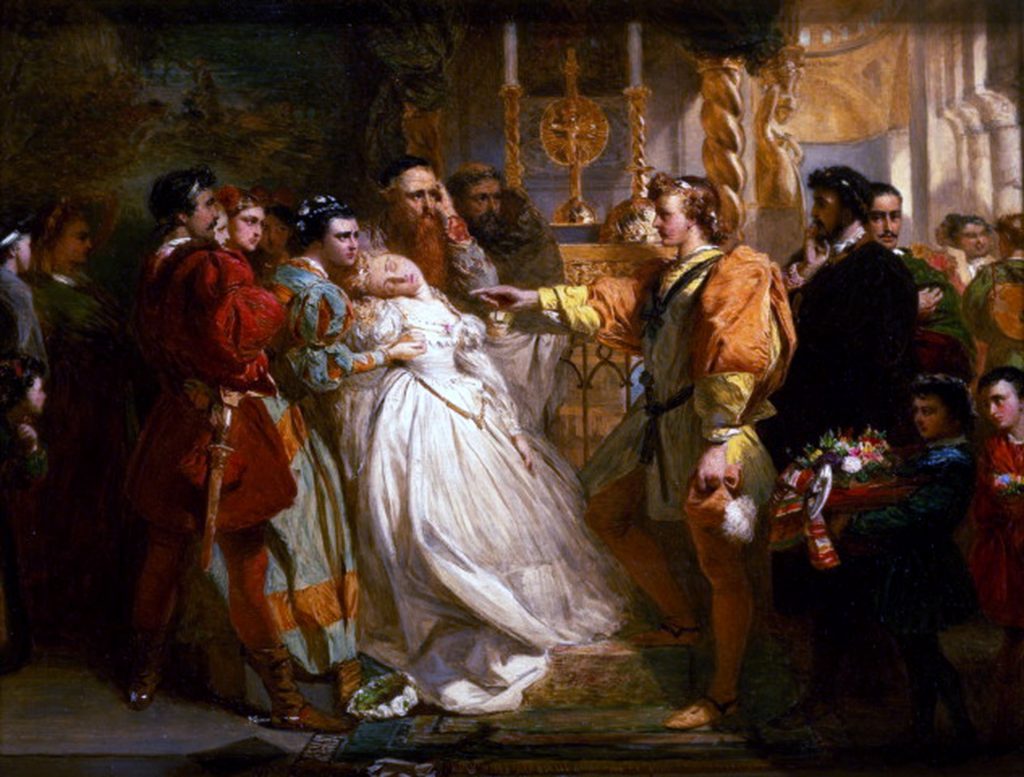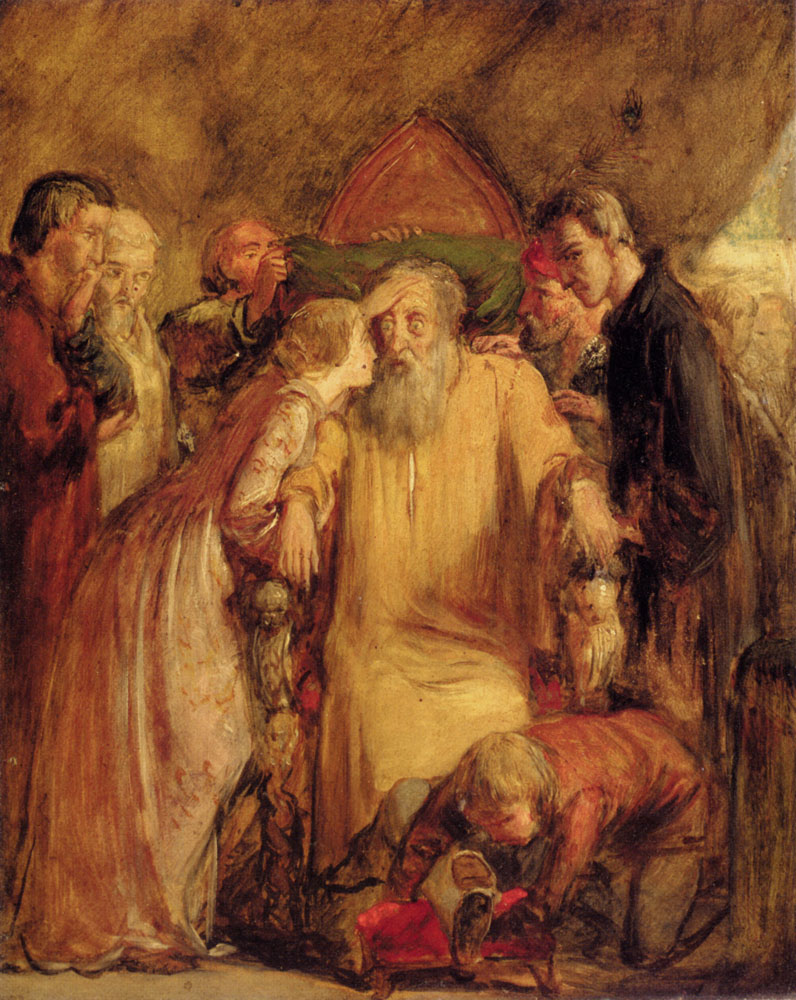In our 2022 season, the Illinois Shakespeare Festival will present two Shakespeare plays in repertory: Much Ado about Nothing and King Lear. At a glance, these celebrated plays seem to be on opposite ends of the spectrum: one is a vibrant romantic comedy while the other is one of Shakespeare’s most cataclysmic tragedies. But I want to offer an odd idea that could bring these two titles together: that “nothing” can be a powerful theme, even an occasion for exciting drama. How does Shakespeare get us to think about nothing in these plays?
Philosophers have obsessed over the concept of nothing, from ancient Greeks and Buddhists to modern thinkers such as Martin Heidegger and Jean-Paul Sartre. Even if we cannot empirically observe nothingness (since we must first exist to think about these things), it has been a fundamental tool in the history of ideas. Why do things exist rather than not exist? What distinguishes existence from nonexistence? Are ideas things? What about numbers or words? Meditating on nothingness has also provoked human beings to question the origins of the world. When Cordelia refuses to vow filial love at the beginning of King Lear, Lear admonishes her: “Nothing will come of nothing” (1.1.99). But if that is the case, then how did anything come to exist in the first place? If all existence comes from nothing, like some creation myths or versions of the Big Bang theory suggest, what caused this change from nothingness to being? Such perplexing questions fascinate some and evoke existential dread in others.
Alternatively, “nothing” could imply a value judgment—that something has no worth or substance. When people lose their sense of self-worth, they feel like nobodies. We’re anxious that we’ve achieved nothing today. Or, we can dream up things like fairies and unicorns, but they don’t exist in the same way that our material reality does. In that sense, they’re nothing, just figments of our imaginations. Yet the theatre thrives in this illusory, insubstantial world. Shakespeare is able to conjure striking mental pictures through language, transforming “this wooden O” into a bloody battlefield or an enchanted forest at night. Theatre shows that nothingness can actually be a powerful magnet for the human mind, enticing us to fill in the blanks. Onstage, there is much ado about nothing.
Let us turn to the playful title of Shakespeare’s comedy. Some readers may know that “nothing” was slang for female genitalia in Shakespeare’s time. Since Shakespeare’s plays are full of bawdy humor, this pun probably crossed his mind at least once. But the sexual reference does not really help us better understand Much Ado about Nothing. Scholars also point out that the title is a pun on “noting”—in other words, paying close attention. In the world of comedy, this often involves setting your heart on a romantic interest, perhaps while feigning disinterest. Falling in love with Hero at first sight, Claudio asks, “Benedick, didst thou note the daughter of Signor Leonato?” to which his friend responds, “I noted her not, but I looked on her” (1.1.159–60). Benedick’s distinction suggests that noting is about more than just seeing what is there. It is about imbuing something or someone with mental and emotional energy.
But what if one’s noting is caused by nothing, as the pun implies? What happens if someone gets wrapped up in a misunderstanding or false information? In the play, the malicious Don John tricks Claudio into believing that Hero is unfaithful. Despite the shoddy evidence, Claudio overreacts and calls off the wedding. Convinced of her innocence, the Friar devises a plan to falsely announce Hero’s death in order to clear her name. Claudio, ever gullible, falls for this trick as well, repenting his mistake. Claudio is given a chance to redeem himself and the love story ends happily, as comedies do. But Much Ado about Nothing leaves us pondering on the danger of seeing something when nothing is there. This play manages to sidestep tragedy, but in later Shakespeare plays such as Othello, Cymbeline, and The Winter’s Tale, unfounded suspicions of infidelity have grave consequences. The takeaway? The clouded mind can easily make something out of nothing.
In King Lear, Edmund fools his father Gloucester into believing that his half-brother Edgar is plotting treachery. Edmund cunningly forges a letter in Edgar’s handwriting and makes a show of hiding it when Gloucester enters. When Gloucester asks what is in the letter, Edmund coyly answers: “Nothing, my lord” (1.2.33)—which coincidentally is the exact same answer that Cordelia gives her father when Lear asks what words of affection she has prepared for him. I already mentioned Lear’s angry response to Cordelia’s silence: “Nothing will come of nothing.” In this scene, Gloucester also dispenses conventional wisdom about nothingness: “The quality of nothing hath not such need to hide itself. Let’s see. Come, if it be nothing, I shall not need spectacles” (1.2.35-37). In other words, Gloucester is confident that he can discern truth from falsity, to know whether this is something or nothing to worry about. But tragically, he cannot tell the difference. He condemns his good son and causes his own destruction.
Later in the play, we see powerful figures reduced to ashen ghosts of their former selves. Gloucester is brutally blinded and thrown out of his own castle. After disinheriting Cordelia, Lear also loses everything—his entourage, his respectability, his grip on reality—until we see him running half-naked through the wilderness. Lear’s tragic fall is all the more poignant because it brings about what the old king fears the most: being reduced to insignificance. To become nothing—meaningless, inconsequential, virtually nonexistent—is a fate worse than death. The Fool voices this truth when he diagnoses Lear’s diminished status: “I am better than thou art now. I am a Fool. Thou art nothing” (1.4.198–99).
Yet the corrupt world of King Lear must pass through this null state to rebuild itself. This is most apparent in Edgar’s journey from noble youth to half-naked beggar and back again. “‘Poor Turlygod! Poor Tom!’ / That’s something yet. ‘Edgar’ I nothing am” (2.3.20–21), he contemplates as he adopts the lowly alias. In these lines, he recognizes that his former identity as “Edgar” has already been reduced to nothing; from here on, he can only survive—exist—as Poor Tom. The latter half of the play turns into a ritual of self-negation for many characters, stripping away layers of the self until all that is left is base human existence. When Lear asks, “Who is it that can tell me who I am?” the Fool quips without missing a beat, “Lear’s shadow” (1.4.236–7). In this diminished state, Lear recognizes Edgar’s abject state when they meet in the wilderness: “Thou art the thing itself; unaccommodated man is no more but such a poor, bare, forked animal as thou art” (3.4.98-100). But by hitting rock bottom, Edgar is able to come out the other side, stronger and more mature. “Edgar” must be rendered into nothing before he can become someone again.
Of course, not everyone can withstand this ritual ordeal of death and rebirth. Gloucester dies offstage, reconciled with his son but his status never restored. Lear, on his last legs, also reunites with Cordelia, who has marshaled the French army to save her father and homeland. It would have been easy for Shakespeare to end the play on an uplifting note, as all the other conflicts are resolved by this point in the play. In fact, many other versions of the King Lear legend end in Cordelia and Lear’s triumph over hardship. But instead, the final scene of Shakespeare’s King Lear is a bone-chilling confrontation with nothingness. Lear enters one last time, carrying Cordelia’s dead body in his arms. His final speech contains a line that consists entirely of absolute negatives, as if the world itself is unraveling with each syllable: “Never, never, never, never, never” (5.3.372). Can anything come after such a devastating statement?
In this article, I have tried to make the case that King Lear meditates on the idea of nothing from multiple perspectives. Lear grapples with the abject horror of nothingness throughout the entire play, and ultimately loses the fight. But for Edgar, nothingness is a rite-of-passage, the dark path he must traverse to find himself again. All in all, I think that Shakespeare was more interested in the positive effects of confronting nothingness, how it can push us out of our comfort zones and reveal deeper truths.
Returning one last time to Much Ado about Nothing, we might wonder whether Beatrice and Benedick’s love is founded on nothing. After all, they are deceived just like Claudio. When the other characters decide to fool Beatrice and Benedick into thinking that the other person secretly pines for the other, their goal could just be to embarrass or humble these haughty know-it-alls. It is all meant to be a joke; the deceivers cannot imagine this forced relationship ever becoming real. But even if it was set off by a whole lot of nothing, Beatrice and Benedick’s love ends up being the most solid, most truthful thing in the play. In this way, Shakespeare shows us that something could potentially come out of nothing. In fact, sometimes we need to focus on nothing to discover what we need the most.



